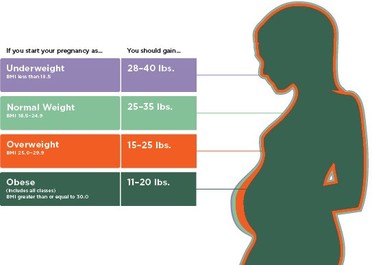 by Emily Oken, MD, MPH This headline came up on my home page last week, linked to an Us Magazine story about a celebrity who had gained 40 pounds during her pregnancy, “and she’s not ashamed.” You might wonder, is she really ‘just like us?’ and more importantly, why should we care about pregnancy weight gain? This celeb’s height (5’ 2”) and pre-pregnancy weight (106 lb) put her body mass index in the normal range. Readers of this blog surely already know that is not like most of us, as more than 2/3 of US adults, including women who become pregnant, are overweight or obese.
According to the US Institute of Medicine, ideal weight gain for women at a normal pre-pregnancy weight is 25 to 35 pounds (see figure). More gain is recommended for women who are underweight entering pregnancy and less gain for women who are overweight or obese. However, about half of women gain more weight than the guidelines advise. So technically - like most American women, especially those who are already overweight when they get pregnant - this celeb gained more weight than recommended during pregnancy. Unlike most American women, this celeb will have access to plenty of assistance in losing that weight after pregnancy. Excessive pregnancy weight gain is linked to potential problems for both mother and baby. As we have found in our research, mothers who gain too much weight are more likely to have a pregnancy complicated by gestational diabetes, to have a cesarean section, and to retain excess weight after delivery. Their children are more likely to become obese and to have elevated cardiovascular risk markers in their blood. Our newest research about pregnancy weight gain has come up with a surprising finding. The amount of weight a mother gains in her first trimester – typically before she may even have had her first visit with her OB – seems to be most predictive of longer term outcomes for mom and child. Greater 1st trimester weight gain predicted higher weight, waist circumference, blood pressure, and insulin resistance (a marker of diabetes risk) up to 10 years after giving birth, whereas more gain in the 2nd and 3rd trimesters did not predict these outcomes. This was true even though mothers gained the least amount of weight in the 1st trimester, about 6 pounds on average, compared with about 12 pounds in each of the 2nd and 3rd trimesters. So while I don’t think that any woman should be “ashamed” of gaining too much weight during pregnancy, it is important for everyone to be aware of the role of healthy pregnancy weight gain for a lifetime of good health. Now, if we could all have our own personal trainers, nutritionists, and health coaches, we could all live like celebrities!
0 Comments
Your comment will be posted after it is approved.
Leave a Reply. |
©2017 WeighingInBlog. All rights reserved. 401 Park Drive, Boston, MA




 RSS Feed
RSS Feed

